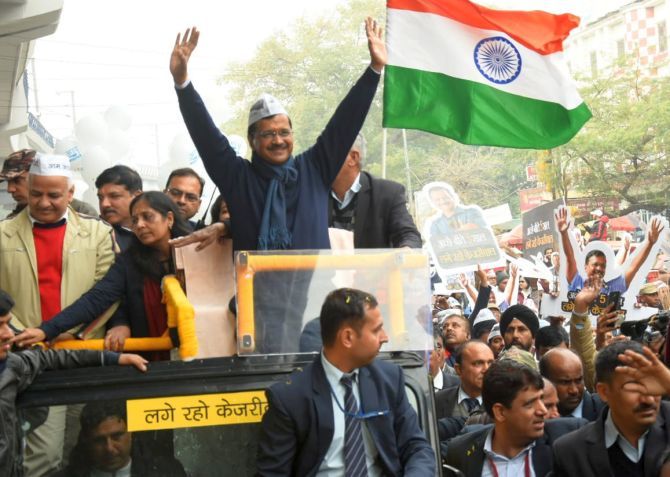 | « Back to article | Print this article |
'February 11, when the results are announced, will hold the key not only to AAP's and the BJP's future, but also to the way the protests against the citizenship law, NRC and NPR evolve,' notes Amulya Ganguli.

It must be an unusual experience for the BJP to go into an election knowing that it will fare badly or even lose.
Until now, the party hadn't faced such an uncertain situation.
For instance, it expected easy victories in Haryana and Maharashtra, but events proved it wrong.
Perhaps because of the setbacks in the two states, the BJP was more careful about predictions in Jharkhand where it suffered a heavy defeat.
Now, it faces an unclear future in Delhi where anecdotal evidence suggests that the Aam Admi Party is the front-runner in the elections to the 70-member legislature.
Unless the Congress cuts heavily into AAP's votes, the BJP doesn't seem to have much chance of success.
Yet, such a scenario was unfeasible in the middle of last year when the BJP won all the seven parliamentary seats in Delhi.
Since then, the BJP has been taking one decision after another in line with its ideological roadmap which, it believes, will bolster its popularity.
But neither the abrogation of Article 370 nor the judicial clearance for the Ram temple's construction nor the citizenship law helped the BJP in Haryana, Maharashtra and Jharkhand and, the belief is, may not in Delhi.
Has Hindutva lost its appeal or do the people have greater faith in the AAP's emphasis on bijli-sadak-pani?
If so, the reason is that the AAP reinvented itself in the nick of time after chasing Arvind Kejriwal's will o' the wisp of a national role for three years.
It was the Congress's ignominious collapse under the burden of corruption which fired Kejriwal's dream of being the next national alternative.
The chimera also drew sustenance from Anna Hazare's fatuous belief in being a second Gandhi who will spell the Congress's doom.
Bloated by the self-perception of presiding over the nation's destiny, Kejriwal took on all and sundry, including some of his own colleagues who detracted from his megalomania with their intellectual and legal carping.
As a result of these internal and external combats, as with several of Delhi's lieutenant governors, Kejriwal reinforced his original image (of which he was proud) of being an anarchist.
Had he continued in the same vein, the BJP would have had no difficulty in winning next month's election in the national capital.
But, for reasons unknown, Kejriwal changed.
He is now a milder, gentler man, not a street fighter who once threatened to disrupt the Republic Day parades and was called a yeda (crazy) by then Union home minister Sushil Kumar Shinde.
The yeda suddenly realized that governance is not about flaunting muscles, but attending to the mundane needs of the people, such as setting up good schools and providing readily available medical facilities.
No party will regret this transformation more than the BJP, for if it stumbles in Delhi, it will be a bad augury for Bihar next year where Chief Minister Nitish Kumar is being advised to up the ante over the citizenship law, the National Register of Citizens aimed at 'termites' (illegal Bangladeshi immigrants) and the National Population Register.
As it is, the campuses are astir with restive students and hundreds of Muslim women have become street warriors by holding sit-ins in open spaces in several cities.
The emergence of women is problematic because they cannot be shot 'like dogs' as per the advice of the BJP's chief in West Bengal, Dilip Ghosh, nor buried alive as a UP minister, Raghuraj Singh, counselled.
It goes without saying that an adverse electoral outcome for the BJP will only encourage these 'anti-nationals' to carry on with their defiance.
February 11, therefore, when the results are announced, will hold the key not only to the AAP's and the BJP's future, but also to the way the protests against the citizenship law, NRC and NPR evolve.
Amulya Ganguli is a writer on current affairs.